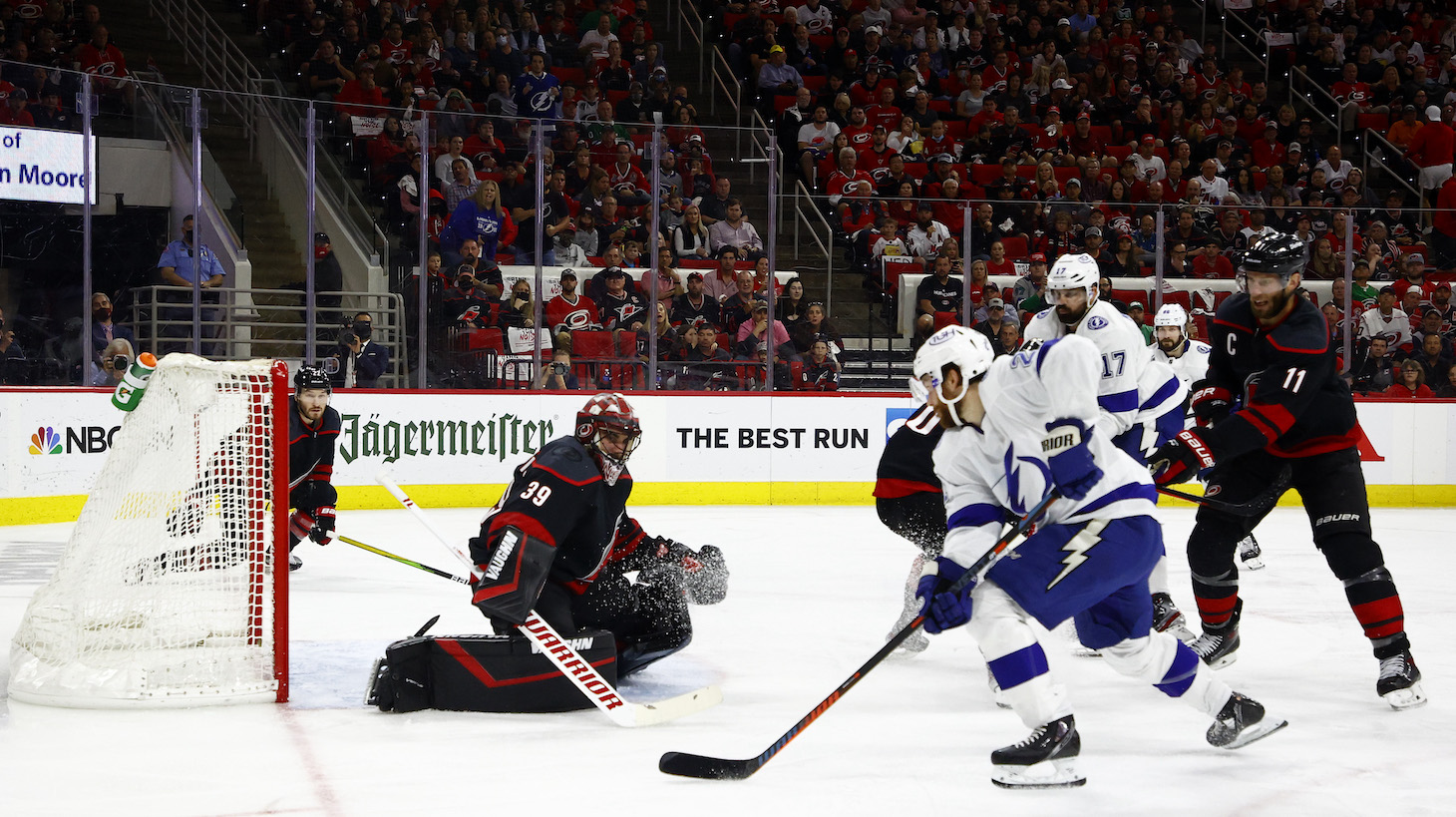I'm willing to hear out arguments, but on nights like this—and on many, many nights in May and June over the last few years—Brayden Point might be the best bargain in hockey. A former third-round pick, and still in the second year of a three-year, $20.5M bridge deal, Point is and has been the defending-champ Lightning's most valuable skater in its most meaningful moments. Not Nikita Kucherov, who has the flash. Not Victor Hedman, who has the hardware. Not Steven Stamkos, for all he's done to turn around hockey in Tampa. When playoff time rolls around, Point is in a league all his own.
With his shining second-period goal to break a scoreless tie in a game that was slanting Carolina's way, Point helped send the Lightning through to the Cup semifinals, and even before you marvel at the goal, marvel at the postseason numbers. This year, through 11 games: eight goals and four assists. Last year, in 23 games: 14 goals and nine helpers. In 2019—well, we don't talk about Tampa's 2019 playoffs around here. But in 2018, over 17 games: seven goals and nine assists. In 55 career playoff games, the 25-year-old center has 62 points. He's got the most playoff goals of anyone in the NHL over that span, even with that first-round sweep, and not by a little. "The moment is just never too big for him," Lightning coach Jon Cooper said.
OK, now the goal. Goddamn.
Point, champion of nominative determinism, is listed at 5-foot-10 and 183 pounds, and I think both of those numbers are generous. He's a little guy, and his speed and uniform make the comparisons to Martin St. Louis inevitable, if not a perfect fit. But he is fast as the dickens, and perhaps more important to his game, his hands and his brain are even faster.
The game slows down for him, perhaps especially in the playoffs, when so many other players tighten up and overthink—you can see it in this goal, as he brings the puck back to his forehand and visibly waits for Alex Nedeljkovic to commit, before going backhand and roofing it. There is not unlimited time here for Point: many players would panic and take the first backhand without settling the puck, expecting a hit at any moment; many more players would take the forehand, settling for one deke. Point isn't those players. He's fully aware of his space and his time, and in that way that top athletes' brains are wired and the rest of us can only try to imagine, he isn't really thinking about any of this, not consciously. It's automatic, his reflexes and senses descrying a hundred different things, and settling, more often than not, on what proves an optimal strategy.
Listen to Point describe the goal. It's a dispassionate recitation of input and output, and almost dismissive of the processing power it requires. “I got to the forehand and the goalie has got me. I make a move to the backhand," Point said. "It’s kind of a reaction, and lucky enough it goes in. I don’t think I’m thinking too much about it.”
Yes, this holds true for anyone good enough to make the NHL, but there are levels, and there's reason to think Point is operating on one of the highest. Shooting percentage isn't a stat hockey people care much about since a lot of other factors play into it, and because it can be so volatile from year to year for a single player it's more often used as a measure of luck than of skill. But things flatten out over larger sample sizes, and eventually it starts to mean something: perhaps that a player is a notably accurate sniper, perhaps that he puts himself in high-danger positions to shoot, perhaps that he's a time wizard who operates at full-speed while the rest of the game appears in slow motion to him. It doesn't really matter to the outcome; all of these things are good things. Brayden Point, at 17.3% for his career, has the highest shooting percentage of any active NHL player. (League average this season was around 9.7%.) In the playoffs, Point's shooting percentage rises to 21.4%. Whatever he's doing, he's earning and taking better shots than anyone else in the league, and he's doing it consistently. "You can see it’s not a fluke," Cooper said.
The fearsomeness of the Lightning is in their completeness. On the uncommon spring night that Point doesn't find the net, they have so many guys who can and do. Maybe Kucherov, or Hedman, or Stamkos, or Ondrej Palat or Alex Killorn, both of whom have built reputations for coming up big in big moments. You're probably not going to shut down all of these guys at the same time, let alone for four games, and even if you do, you still need to beat Andrei Vasilevskiy, who just might be the league's best goalie in a decade. Point has the luxury of being able to take games off, but he's also got the talent and skillset to ensure he almost never does.
Oh, and he'll still be an RFA when his contract is up next summer.






